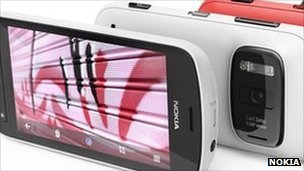
808 Pureview, the 41-megapixel Nokia smartphone using Symbian, was among the new technology on show during the opening day of Mobile World Congress (MWC) in Barcelona.
Nokia 808 Pureview offers enhanced low-light performance as well as sophisticated image compression designed to help users share pictures.
Nokia hopes to regain ground lost to Google and Apple in the mobile market.
However, some have criticized Nokia’s decision to use its own operating system, Symbian, on the device.
Nokia’s other smartphones typically run on Microsoft’s Windows Phone software.
Symbian, which first appeared on Nokia phones in the 90’s, is widely regarded as inferior to the app and social media-driven Windows Phone system.
“The Pureview 808’s Symbian Belle operating system might detract from its appeal to a broader market, where it deserves recognition,” said Tony Cripps, a principal analyst with Ovum.
“It’s a pity that Nokia was unable to combine the photographic prowess of the PureView 808 with the style of the Lumia 900.
“Such a device may well have been the first smartphone to truly deserve the title of <<superphone>>.”
Nokia claims the 808 Pureview sets a “new industry standard” in mobile imaging devices.
“People will inevitably focus on the 41 megapixel sensor,” said Jo Harlow, executive vice-president of Nokia smart devices.
“But the real quantum leap is how the pixels are used to deliver breathtaking image quality at any resolution and the freedom it provides to choose the story you want to tell.”

Also on show were new models in the company’s Lumia range – including the 610, a cheaper device aimed at a “younger audience”.
Nokia also announced it plans to make the Lumia available in China “in the coming months”.
Nokia’s chief executive Stephen Elop said that introducing the cameraphone and entry-level smartphone were “the actions necessary to improve the fortunes of Nokia”.
Once the mobile world’s dominant player, Nokia has struggled to compete as sales of Google and Apple devices have soared in recent years.
Last month Nokia announced it was to stop manufacturing mobile phones in Europe, instead relocating to Asia at a cost of 4,000 jobs.